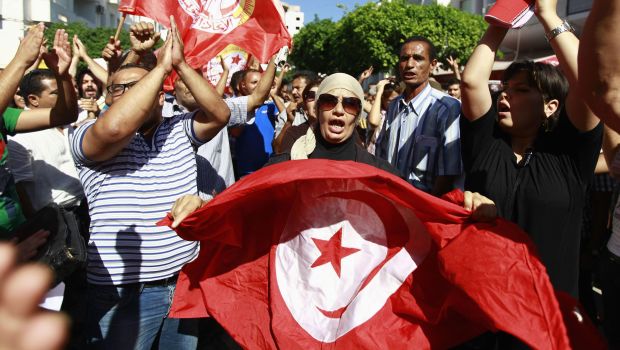
Anti-government protesters wave Tunisian flags as they rally for the dissolution of the Islamist-led government in Sfax, 170 miles (270 km) southeast of Tunis, on September 26, 2013. (REUTERS/Anis Mili)
Tunis, Asharq Al-Awsat—On Wednesday, the speaker of the Tunisian Constituent Assembly, Mustapha Ben Jafar, met with secretary-general for the Tunisian General Labor Union (UGTT) Hassine Abassi to prepare for the first round of political dialogue between the government and the opposition and establish greater trust between the two sides.
Viewed as a critical step, the meeting came against the backdrop of the Ennahda Movement’s initial acceptance of the resignation of Ali Laarayedh’s government, Asharq Al-Awsat has learned.
The opposition had requested the resignation of the Ennahda-led government, while the Tunisian Call Party (Nida Tounes) insisted that Tunisian president Moncef Marzouki also step down.
Early this week, Ben Jafar oversaw a meeting between Abassi and the head of the governing Ennahda Movement, Rachid Ghannouchi, in a step that accelerated consultations prior to the talks.
Ben Jafar has headed a series of critical meetings between the government and the opposition in a bid to find common ground between both sides.
Being a neutral figure in the Tunisian political arena, Ben Jafar has earned the trust of both sides.
While seen as close to the opposition, Ben Jafar enjoys Ennahda’s trust.
Some of the political parties represented in the Constituent Assembly, such as the Wafa Movement, said they would not participate in the next round of talks due to what it called “impartiality of the bodies sponsoring the talks.”
Tayyar Ae’doon, composed of several parties and associations, issued a statement rejecting the UGTT’s initiative, as well as any talks with forces it described as anti-revolution.
The head of the Tunisian Call Party, Beji Caid El-Sebsi, expressed optimism over the launch of the dialogue, but voiced concerns that the dialogue will be delayed due to the Ennahda Movement’s hesitation in accepting the resignation of the government.
Commenting on the issue to Asharq Al-Awsat, a senior member of the Tunisian Call, Adil Shawish, denied that his party’s insistence on the removal of President Marzouki was due to delays in launching talks.
Shawish said that the opposition’s main demands include the resignation of the government and the establishment of a time frame to enforce the roadmap.
Meanwhile, 54 parliamentarians who had withdrawn from the assembly said they would only return when Ennahda fulfills its commitment to the immediate implementation of the roadmap set out by the sponsors of the national dialogue.
The roadmap requires that Laaraydh’s government resign once the national dialogue kicks off and that the Constituent Assembly resume its work on drafting out the constitution and forming an independent supreme council for elections.
